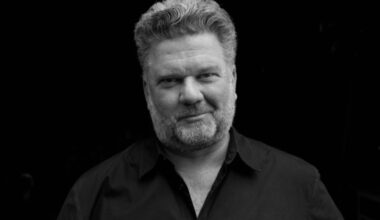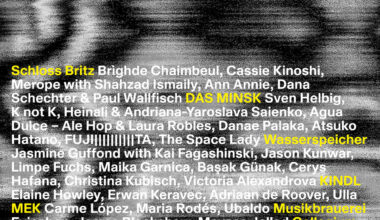Danae Palaka is an Istanbul-based artist who utilizes drums as her main medium of sound. Born in Athens to a musical family that partially hails from Istanbul, she relocated there to explore her heritage and the city. Danae Palaka plays at our Kiezsalon x DAS MINSK in Potsdam on Thursday, 19 June, along with Atsuko Hatano and NikNak.
Her drumming style blends Anatolian and Balkan rhythms with Afrobeat, UK jazz, and electronic music while her artistic vision is rooted in the belief that rhythm can serve as a bridge between tradition & present. Her debut album, Velox, released by A.F.O.M. INT, captures memories, rhythmic complexity, and sonic textures through the synergy of drum kit and analog synthesizers.
FACTS
1. Rhythms coexist in peace, and so can people.
2. As a third-generation Istanbullu who returned to the city, my perception of belonging has shifted. Having been involved in the Istanbul Greek Orthodox (Rum) community, I realized that I already grew up with many elements of this particular group’s culture, preserved through my grandmother and my mother.
3. Free Time
1. What is the biggest inspiration for your music?
Sometimes it’s just the sound of the drums. Other times inspiration comes from thoughts or feelings that emerge, triggered by circumstances or realisations. A big influence for me are the traditional musics of Balkans and Anatolia, and so I tend to integrate them into my drum performance; for me to become, somehow, an agent of cultural transmission, a reminder of what existed already and a creator of new versions and stories. Through this process, I also shape my mission and identity, and so the process itself becomes the source of inspiration.
2. How and when did you get into making music?
I started my solo project a couple of years ago. It was the result of my need to perform solo with drums – to let percussion and rhythm talk. Over time, this idea evolved into what it is today with synths & melodic layers, but it’s still constantly re-shaping. I’ve been playing the drums for the past 14 years but as my father is a musician he taught me piano at an early age. I remember composing melodies since I was 5.
3. What are 5 of your favourite albums of all time?
Max Roach – Drums Unlimited
Laurel Spiegel – The expanding universe
Nala Sinerpho – Space 1.8
Maffy Falay – Jazz | Sverige
Talking Heads – Remaining Light
4. What do you associate with Berlin?
Soon to travel there for the first time – I guess my associations are based on assumptions. However, it’s an unknown place that feels can easily become friendly – associated with culture, calmness, friends and brutalist architecture.
5. What’s your favourite place in your town?
I live in Istanbul, moved here 4 years ago – I genuinely love this city, because it feels both like grandma’s village [literally] and a new megapolis to explore. I miss it even when I’m here. Would be hard to choose just one spot, but lately I find peace and magic walking around Rumeli Hisarı.
6. If there was no music in the world, what would you do instead?
Linguistics, or maybe literature. I am interested in how the languages evolve and still contain common elements from their previous versions or related languages (same thing happens to rhythms). And literature, because it creates worlds out of scratch – just like music.
7. What was the last record/music you bought or listen?
I recently bought Warrington-Runcorn New Town Development Plan – Your Community hub which I’m listening to in repeat – especially the last track.
8. Who would you most like to collaborate with?
Agnes Varda – Shabaka Hutchings – Selim Sesler.
For non-human collaborations, water and mountains, and Kookee the cat.
9. What was your best gig (as performer or spectator)?
As a performer, it was the release party of my album Velox (October 2024). It was the first time that I played my ideas live with other people. Also, so many people and friends were present that day, and made it even more special; I was genuinely happy. As a spectator – the solo davul performance of Cevdet Erek in Arter, February 2024. I was so captivated and immersed into the sound that I didn’t move for 40 minutes – my leg was completely numb.
10. How important is technology to your creative process?
Technology is quite important – but not an essential element. Generally, I try to remain analogue – drums or synthesisers – but I do use Ableton Live or Roland SPD-sx to develop my ideas towards a more complete form. For other projects that are not drum kit based, I utilize it even more. Generally, I initially develop ideas on the kit and later in the process I use software when I need to.
11. Please tell us more about your current research for your PhD in Istanbul?
I’m doing my PhD in Istanbul Technical University – Centre of Advanced Studies in Music (MIAM) and my study is a practice-based research that aspires to investigate the relationship between musical rhythms and their impact on our perception of time, place and belonging. I’m curious to explore how temporal layers intersect with the phenomenology of time and generate connections with cultural memory and historical narratives in modern cities. Inspired by Istanbul’s multilayered nature, where communities coexist and past and present constantly blend, my work is rooted in the idea that just as our perception of rhythm shifts depending on which beat we emphasize, our understanding of history and social dynamics is shaped by the perspectives we choose to focus on.


